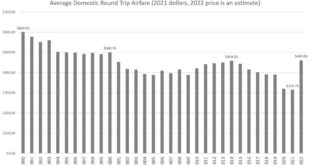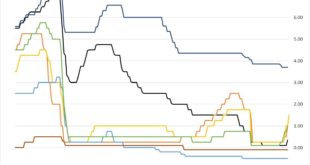Tom Woods’ bestseller Meltdown placed the blame for the financial debacle of 2008–09 on the government’s counterfeiter, the Federal Reserve. It was the Fed’s policies that created the problems, although most economists and economic talking heads didn’t see it that way. The Fed’s loose monetary policies funded the meltdown and became the “elephant in the living room” most pundits couldn’t see. Woods was right, of course; putting a monopoly counterfeiter in charge of...
Read More »Does Capitalism Make Us More Materialistic?
There was a time when the advocates of socialism argued that it would lead man to material abundance, whereas free-market capitalism would lead only to increasing misery and would ultimately collapse under its own internal stresses. You don’t hear that too much these days, and for good reason. A century of empirical evidence has shown the contrary—that the free market leads to increasing wealth and material freedom, while socialism leads us only to poverty, state...
Read More »Finland and Sweden in NATO: Disregarding the Benefits of Neutrality
Finland and Sweden’s recent decision to apply for North Atlantic Treaty Organization membership is a major win for the military alliance, but a far more dubious one for these two countries. NATO badly needs a success at this moment, since neither the economic war on Russia nor the conflict in Ukraine seems to be going the West’s way. Whether officially adding two more Nordic countries would have a real military advantage for NATO remains to be seen, but at least it...
Read More »Greenspan Would Be Proud: A Lesson in Fed Speak
It has become a familiar sight over the past decade and a half: a supposedly venerable member of the financial elite tells us with utmost calm that what we think we are seeing isn’t really all that bad. The Fed already knows all about it and has already taken all necessary steps. Further, they are monitoring the situation closely and are ready to make any necessary adjustments with ease and alacrity. Reading the Fed’s meeting minutes and picking through its actual...
Read More »Debt-Fueled Demand and Oil Price Inflation Brings Airfares Roaring Back
If you’ve purchased any airline tickets lately, you’ve probably noticed that prices are up. It’s quite a reversal from the days of covid lockdowns, when airline tickets could be had for half the price of 2019 fares. Or even lower, in many cases. But those days are apparently over, and as Yahoo Finance notes this week: Airline fares soared 18.6% in April, according to the latest Consumer Price Index (CPI) report from the Bureau of Labor Statistics (BLS)…. The jump,...
Read More »Bastiat Predicted the Baby Formula Crisis 170 Years before It Happened
The current baby formula shortage in the United States is a pressing crisis, and many in the media have been rushing to explain how such a thing could have happened. But on close analysis, it appears to share the same root as virtually every other crisis experienced in the modern world: a government promised benefits without costs. Our political leaders either fail to understand or outright ignore the basic, unavoidable limitation on government action, that no...
Read More »Why Russia’s Authoritarian Regime Continues to Enjoy Public Support
One of my areas of research in institutional economics is the social behavior of people under different political regimes, what Thomas Schelling called micromotives and macrobehavior. Of course, this topic is directly related to many disciplines, from behavioral economics and political theory to the neurobiology of decision-making and the theory of biological markets. The theme raises the following question: What are the reasons for the broad social support of the...
Read More »Don’t Be Fooled: The World’s Central Bankers Still Love Inflation
The Bank of Canada on Wednesday increased its policy interest rate (known as the overnight target rate) from 1.0 percent to 1.5 percent. This was the second fifty–basis point increase since April and is the third target rate increase since March of this year. Canada’s target rate had been flat at 0.25 percent for twenty-three months following the bank’s slashing of the target rate beginning in March 2020. As in the United States and in Europe, price inflation rates...
Read More »Does an Increase in Demand Cause Economic Growth? How Keynesians Reverse the Roles of Demand and Supply
According to John Maynard Keynes: The ideas of economists and political philosophers, both when they are right and when they are wrong, are more powerful than is commonly understood. Indeed, the world is ruled by little else. Practical men, who believe themselves to be quite exempt from any intellectual influence, are usually the slaves of some defunct economist. Madmen in authority, who hear voices in the air, are distilling their frenzy from some academic scribbler...
Read More »The German Rejection of Classical Economics
1. The German Rejection of Classical Economics The hostility that the teachings of Classical economic theory encountered on the European continent was primarily caused by political prepossessions. Political economy as developed by several generations of English thinkers, brilliantly expounded by Hume and Adam Smith and perfected by Ricardo, was the most exquisite outcome of the philosophy of the Enlightenment. It was the gist of the liberal doctrine that aimed at the...
Read More » Swiss Economicblogs.org
Swiss Economicblogs.org










